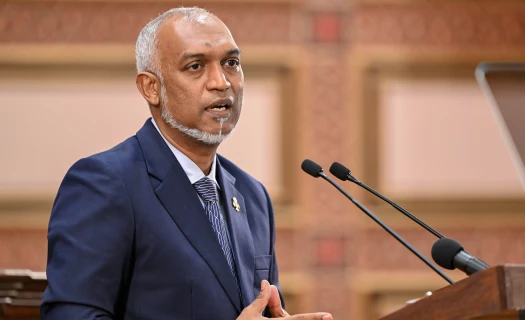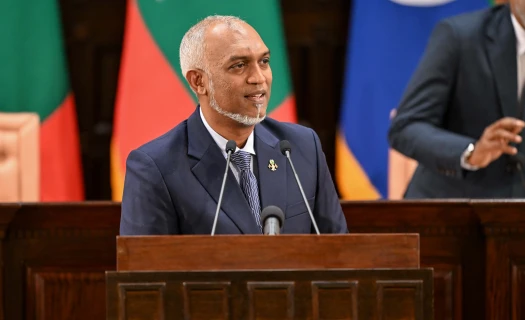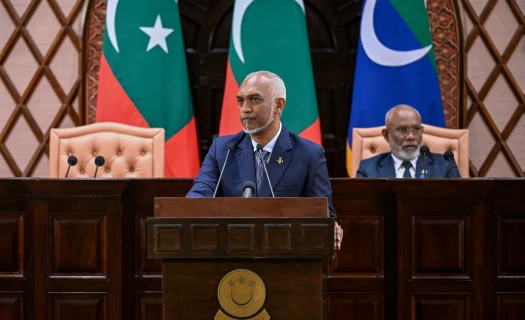Fri, 06 Feb 2026
|DHIVEHI
The flavours of Fitr Eid: A Maldivian celebration of food and togetherness
30 Mar 2025
|

Photo: Coco Collection
As the first light of dawn stretches over the Maldives, a quiet sense of anticipation fills the air. It is Eid al-Fitr, or Kuda Eid, a day of joy, reflection, and togetherness. In homes across the islands, families stir awake to the rhythm of tradition—prayers, preparations, and the unmistakable aroma of Eid delicacies filling their kitchens.
For generations, food has been at the heart of Maldivian Eid celebrations. More than just a feast, it is a bridge between past and present, a language of love spoken through shared meals and time-honored recipes.
As the first call to prayer fades into the morning breeze, families gather for Eid breakfast. While homes across the country prepare an array of dishes for Eid, there is one item that no Maldivian Eid breakfast would be complete without—kulhi boakibaa. This savory fish cake, rich in history and flavor, holds a deep emotional connection to the day.
Some claim that Eid morning simply wouldn’t feel like Eid without boakibaa.
“Eid breakfast would not have been celebrated if we didn’t eat boakibaa,” one person insists.
In bustling Malé, the demand for boakibaa surges as Eid approaches. Local boakibaa makers shared that with only a couple of days left before the end of the fasting month, orders had already been pouring in.
In the atolls, the preparation of boakibaa begins the day before Eid. In Addu and Huvadhoo, friends share a common experience—by the time Eid morning arrives, the kitchen is filled with the mouthwatering aroma of freshly baked boakibaa, but if not carefully guarded, it might disappear before breakfast is even served!
"The ladies of the house take special care to keep the boakibaa safe after making it," one friend shares with a chuckle.
Preparing boakibaa for Eid morning is a tradition that has remained unchanged for generations. While modern kitchens use ovens or stoves, many elders insist that boakibaa cooked the old-fashioned way—in a wood stove or a dedicated hearth—tastes infinitely better.
For many, the true joy of Eid breakfast lies not just in the food but in the people who gather around it.
"Every Eid, my family prepares food the night before," one islander recalls, "And after the prayers, we go from house to house with our cousins and relatives."
As the day unfolds, so does the celebration. In the heart of the island, a long wooden table is set under the shade of a mango tree. It is time for Eid lunch.
Platters of chicken dishes such as curries take center stage, surrounded by fragrant rice dishes like folaa. Side dishes—salads, pappadum, and bowls of and custards and other deserts add the final touch to a feast crafted with love.
Cooking for Eid is never a solitary task. In the days leading up to the celebration, families come together, each person playing a role.
"The whole family coming together in one place for Eid food preparation rekindles our bond," someone shares. "Along with that, sharing food with neighbors and relatives brings us even closer."
However, traditions too evolve. Some elders recall a time when every home made only traditional dishes—when boakibaa was the star of the Eid table.
"When I was younger, it was more traditional food," one woman reflects. "Now, I see more Western dishes, like spaghetti, on the Eid table."
Another adds, "When I was a kid, we would have two types of boakibaa all the time. Now that I'm older we have more different dishes. Easy to make more kid friendly options"
In Malé, the shift is even more noticeable. Restaurant-prepared meals are becoming more common, with families opting for takeout or dining out.
"Urban areas now have more restaurant and café-based delivery systems to prepare food,” explains one Malé resident.
Yet, in island communities, home-cooked meals remain at the heart of the celebration.
One of the most cherished customs of Eid was once the act of sharing food beyond family circles—neighbors exchanging plates, ensuring no one celebrated alone. An old saying captures the essence of this tradition: "To the sound of you scraping off the last piece of rice from your pot, your neighbors would come running with food."
Times have changed. "We used to give food to neighbors before," one person reminisces, "But now it’s mostly just family."
Another remembers the joy of receiving plates of food from relatives visiting for Eid—an exchange that, in some places, is becoming rarer.
In Malé, this shift is most apparent.
“Now, this is mostly seen in islands and rarely in the city,” one person notes. “If it happens, it’s mostly just between family members.”
While food-sharing has become less common in urban areas, the spirit of generosity remains. Many communities still make a special effort to prepare and share food with those in need, keeping the essence of Eid alive through acts of kindness.
At the same time, many people in Malé exchange thashibari—sending Eid food to relatives and close friends. Unlike the island-style communal feasts, where large families gather under one roof, thashibari allows loved ones across the city to share the joy of Eid, even if they cannot dine together.
Beyond food exchanges, it is also common for families in Malé to extend invitations for Eid lunch. Some relatives visit multiple homes throughout the day, enjoying meals in different households and strengthening family ties. Though modern lifestyles have changed how people celebrate, the spirit of generosity and connection remains strong through these shared meals.
Despite the differences between island and city life, one thing remains unchanged—Eid is a celebration of togetherness whether through a lovingly prepared home-cooked meal or a gathering at a favorite restaurant
As one islander reflects, “It’s important to have good relations with your family and neighbors to build a strong community. Sharing food is a simple but powerful way to maintain those ties. People are more secluded these days, but I hope we never lose that connection.”
And so, as another Eid dawns, the tradition continues. Across the Maldives, families gather, recipes are passed down, and the taste of Eid—rich, warm, and full of history—lives on, carrying with it the timeless spirit of unity, love, and celebration.








